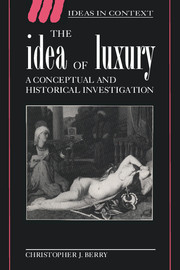2 - The Platonic prelude
Published online by Cambridge University Press: 01 June 2011
Summary
The concept of luxury has had an eventful history. Its contemporary usage in the rhetoric of advertising is far removed from the opprobrium to which it was subjected by Cato the Elder. We shall discuss Cato's position and that of subsequent generations of Roman moralists in Chapter 3. While it is the Roman usage that achieved paradigmatic status for future thought, that usage itself was not without precedent. In this chapter I examine in some detail perhaps the most notable precedent – Plato's account in Book 11 of the Republic.
Before proceeding I should explain the relative lack of attention that Aristotle will receive. The simple explanation is that Aristotle in fact says very little about luxury. This is not to say, however, that his contribution to the topic is slight. This contribution lies not in a specific discussion but in the general teleological cast of his philosophy. As we shall see it is the assumptions of that approach which underpin the discussion of luxury up until the seventeenth century. It is testament to this fact that the overturning of those assumptions heralded, not coincidentally, the first moves away from the negative and toward a positive assessment of luxury. It is the very diffuseness and generality of Aristotle's contribution that makes it appropriate to treat him sparingly in this chapter.
- Type
- Chapter
- Information
- The Idea of LuxuryA Conceptual and Historical Investigation, pp. 45 - 62Publisher: Cambridge University PressPrint publication year: 1994

